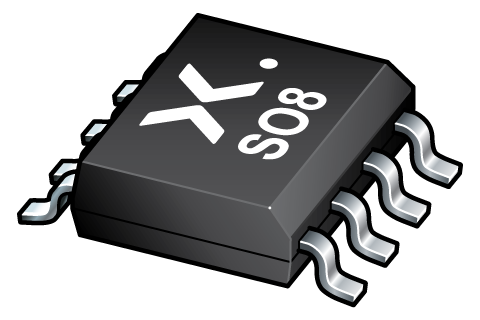
Register once, drag and drop ECAD models into your CAD tool and speed up your design.
Click here for more information74HC6323AD
Programmable ripple counter with oscillator; 3-state
The 74HC6323A; 74HCT6323A is an oscillator designed for quartz crystal combined with a programmable 3-state counter, a 3-state output buffer and an overriding asynchronous master reset (MR). With the two select inputs S1 and S2 the counter can be switched in the divide-by-1, 2, 4 or 8 mode. If left floating the clock is divided by 8. The oscillator is designed to operate either in the fundamental or third overtone mode depending on the crystal and external components applied. On-chip capacitors minimize external component count for third overtone crystal applications. The oscillator may be replaced by an external clock signal at input X1. In this event the other oscillator pin (X2) must be floating. The counter advances on the negative-going transition of X1. A LOW level on MR resets the counter, stops the oscillator and sets the output buffer in the 3-state condition. MR can be left floating since an internal pull-up resistor will make the MR inactive.
The X1 input has CMOS input switching levels and may be driven by a TTL output using a pull-up resistor connected to VCC. Inputs include clamp diodes. This enables the use of current limiting resistors to interface inputs to voltages in excess of VCC.
Features and benefits
- Programmable 3-stage ripple counter
- Suitable for over-tone crystal application up to 50 MHz (VCC = 5 V ± 10%)
- 3-state output buffer
- Two internal capacitors
- Recommended operating range for use with third overtone crystals 3 to 6 V
- Oscillator stop function (MR)
- Input levels:
- For 74HC6323: CMOS level
- For 74HCT6323: TTL level
- ESD protection:
- HBM JESD22-A114-A exceeds 2000 V
- MM JESD22-A115-A exceeds 200 V
- Specified from -40 °C to +85 °C and from -40 °C to +125 °C
Applications
- Control counters
- Timers
- Frequency dividers
- Time-delay circuits
- CIO (Compact Integrated Oscillator)
- Third-overtone crystal operation
Parametrics
| Type number | Package name |
|---|---|
| 74HC6323AD | SO8 |
PCB Symbol, Footprint and 3D Model
| Model Name | Description |
|---|---|
|
|
Package
All type numbers in the table below are discontinued.
| Type number | Orderable part number, (Ordering code (12NC)) | Status | Marking | Package | Package information | Reflow-/Wave soldering | Packing |
|---|---|---|---|---|---|---|---|
| 74HC6323AD | 74HC6323AD,112 (935013710112) |
Obsolete | 7C6323A |

SO8 (SOT96-1) |
SOT96-1 |
SO-SOJ-REFLOW
SO-SOJ-WAVE WAVE_BG-BD-1 |
Not available |
| 74HC6323AD,118 (935013710118) |
Obsolete | 7C6323A | SOT96-1_118 |
Environmental information
All type numbers in the table below are discontinued.
| Type number | Orderable part number | Chemical content | RoHS | RHF-indicator |
|---|---|---|---|---|
| 74HC6323AD | 74HC6323AD,112 | 74HC6323AD |
|
|
| 74HC6323AD | 74HC6323AD,118 | 74HC6323AD |
|
|
Series
Documentation (9)
| File name | Title | Type | Date |
|---|---|---|---|
| 74HC_HCT6323A | Programmable ripple counter with oscillator; 3-state | Data sheet | 2018-07-09 |
| AN11044 | Pin FMEA 74HC/74HCT family | Application note | 2019-01-09 |
| Nexperia_package_poster | Nexperia package poster | Leaflet | 2020-05-15 |
| SO8_SOT96-1_mk | plastic, small outline package; 8 leads; 1.27 mm pitch; 4.9 mm x 3.9 mm x 1.75 mm body | Marcom graphics | 2017-01-28 |
| SOT96-1 | plastic, small outline package; 8 leads; 1.27 mm pitch; 4.9 mm x 3.9 mm x 1.75 mm body | Package information | 2020-04-21 |
| SO-SOJ-REFLOW | Footprint for reflow soldering | Reflow soldering | 2009-10-08 |
| HCT_USER_GUIDE | HC/T User Guide | User manual | 1997-10-31 |
| SO-SOJ-WAVE | Footprint for wave soldering | Wave soldering | 2009-10-08 |
| WAVE_BG-BD-1 | Wave soldering profile | Wave soldering | 2021-09-08 |
Support
If you are in need of design/technical support, let us know and fill in the answer form we'll get back to you shortly.
Longevity
The Nexperia Longevity Program is aimed to provide our customers information from time to time about the expected time that our products can be ordered. The NLP is reviewed and updated regularly by our Executive Management Team. View our longevity program here.
Models
No documents available
PCB Symbol, Footprint and 3D Model
| Model Name | Description |
|---|---|
|
|
How does it work?
The interactive datasheets are based on the Nexperia MOSFET precision electrothermal models. With our interactive datasheets you can simply specify your own conditions interactively. Start by changing the values of the conditions. You can do this by using the sliders in the condition fields. By dragging the sliders you will see how the MOSFET will perform at the new conditions set.